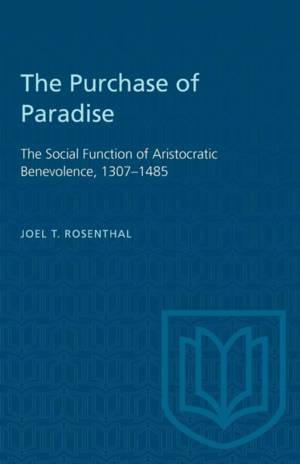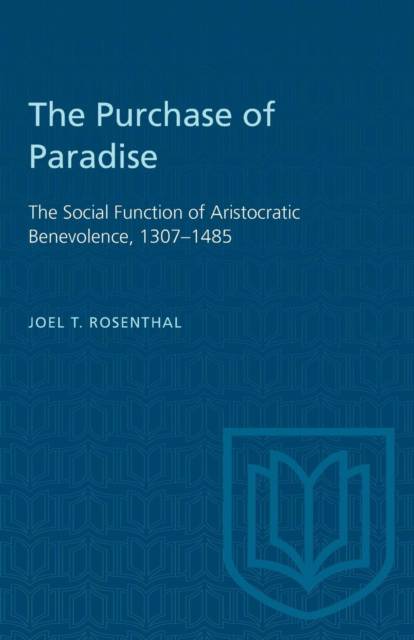
- Afhalen na 1 uur in een winkel met voorraad
- Gratis thuislevering in België vanaf € 30
- Ruim aanbod met 7 miljoen producten
- Afhalen na 1 uur in een winkel met voorraad
- Gratis thuislevering in België vanaf € 30
- Ruim aanbod met 7 miljoen producten
The Purchase of Paradise
The Social Function of Aristocratic Benevolence, 1307-1485
Joel T RosenthalOmschrijving
This account of medieval philanthropy books at the late medieval aristocracy as a social, rather than a political group, and analyses an aspect of their voluntary behaviour, their gift giving to the Church.
In the course of his study, Dr. Rosenthal clears up many of the current misconception about the nature of charity in the Middle Ages. He points out, for example, that the great endowments -- like Ewelme and Pembroke Hall, Cambridge -- were unusual, for most noble families were more concerned to endow a local charity or to purchase prayers after death, to be said by a local priest or chaplain.
The author gives an insight into the noble family of the time, as revealed by such charitable practices as the buying of prayers for relatives, and the family traditions of support for facoured houses which lasted through several generations. He shows that the family was the operative unit for most forms of benefaction and ecclesiastical contact, and that the hard necessities of baronial politics were often ignored when men turned their thoughts to philanthropy and prayers for their immortal souls.
The book will be of value not only to historians, but also those in the field of anthropology or sociology who are interested in the historical applications of the theory and practice of their subject.
Specificaties
Betrokkenen
- Auteur(s):
- Uitgeverij:
Inhoud
- Aantal bladzijden:
- 184
- Taal:
- Engels
- Reeks:
Eigenschappen
- Productcode (EAN):
- 9781487572525
- Verschijningsdatum:
- 15/12/1972
- Uitvoering:
- Paperback
- Formaat:
- Trade paperback (VS)
- Afmetingen:
- 140 mm x 216 mm
- Gewicht:
- 240 g

Alleen bij Standaard Boekhandel
Beoordelingen
We publiceren alleen reviews die voldoen aan de voorwaarden voor reviews. Bekijk onze voorwaarden voor reviews.











